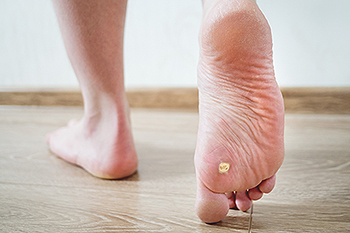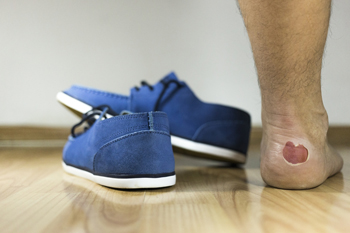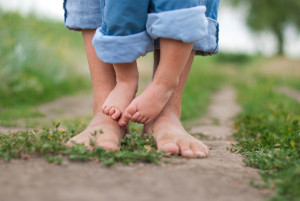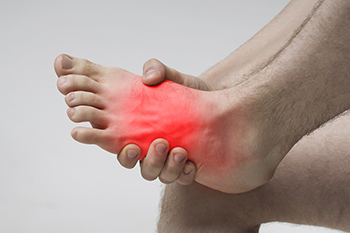Items filtered by date: November 2023
Diagnosis of Plantar Warts

Plantar warts, also known as verrucae plantaris, are warts that appear on the bottom of the feet, often in areas that bear weight like the heels, toes, and the middle of the foot. These warts can be particularly painful and difficult to treat because walking puts pressure on them, causing them to grow inward. Sometimes, many warts can grow together, forming what is known as mosaic warts. It can be hard to tell plantar warts apart from corns or calluses. Corns are hard skin that forms over joints from pressure and rubbing. They have a hard core and do not have the small black dots that warts do. Soft corns form in moist areas between toes due to pressure and rubbing. Another condition often mistaken for plantar warts is black heel, which can be seen in athletes like tennis or basketball players. This is where tiny blood vessels break, causing small black or brown spots on the heel or side of the foot. Carefully removing the top layer of skin can help separate this condition from warts, calluses, corns, and serious issues such as malignant melanoma. If you have what appears to be a wart on your foot, it is suggested that you make an appointment with a podiatrist for a proper diagnosis and treatment.
Plantar warts can be very uncomfortable. If you need your feet checked, contact the foot specialists from Podiatry Associates of Belleville. Our doctors will assist you with all of your foot and ankle needs.
About Plantar Warts
Plantar warts are the result of HPV, or human papillomavirus, getting into open wounds on the feet. They are mostly found on the heels or balls of the feet.
While plantar warts are generally harmless, those experiencing excessive pain or those suffering from diabetes or a compromised immune system require immediate medical care. Plantar warts are easily diagnosed, usually through scraping off a bit of rough skin or by getting a biopsy.
Symptoms
- Lesions on the bottom of your feet, usually rough and grainy
- Hard or thick callused spots
- Wart seeds, which are small clotted blood vessels that look like little black spots
- Pain, discomfort, or tenderness of your feet when walking or standing
Treatment
- Freezing
- Electric tool removal
- Laser Treatment
- Topical Creams (prescription only)
- Over-the-counter medications
To help prevent developing plantar warts, avoid walking barefoot over abrasive surfaces that can cause cuts or wounds for HPV to get into. Avoiding direct contact with other warts, as well as not picking or rubbing existing warts, can help prevent the further spread of plantar warts. However, if you think you have developed plantar warts, speak to your podiatrist. He or she can diagnose the warts on your feet and recommend the appropriate treatment options.
If you have any questions please feel free to contact our office located in Belleville, NJ . We offer the newest diagnostic and treatment technologies for all your foot and ankle needs.
Insight into Foot Blisters

Foot blisters are fluid-filled pockets that form on the skin's surface, commonly caused by friction, heat, and moisture. These blisters can be painful and uncomfortable, affecting individuals of all ages. Friction is a primary culprit in blister formation. When the skin repeatedly rubs against footwear or other surfaces, it can lead to irritation, causing a blister to develop as a protective mechanism. Wearing ill-fitting shoes, especially those that are too tight or loose, can exacerbate this problem. Heat and moisture also contribute to blister development. When your feet sweat excessively, it creates a moist environment inside your shoes, increasing the risk of friction. In hot weather, sweat can make the skin more vulnerable to blistering. Another potential cause of blisters is burns, whether from hot surfaces, chemicals, or sunburn, as they can damage the skin and result in blister formation. Understanding the causes of foot blisters is essential for prevention. If you do develop a blister, it is important to protect and care for it to avoid infection and promote healing, and a podiatrist can help you accomplish this. It is suggested that you contact this type of doctor who can guide you toward healing and prevention techniques.
Blisters may appear as a single bubble or in a cluster. They can cause a lot of pain and may be filled with pus, blood, or watery serum. If your feet are hurting, contact the foot specialists of Podiatry Associates of Belleville. Our doctors can provide the care you need to keep you pain-free and on your feet.
Foot Blisters
Foot blisters are often the result of friction. This happens due to the constant rubbing from shoes, which can lead to pain.
What Are Foot Blisters?
A foot blister is a small fluid-filled pocket that forms on the upper-most layer of the skin. Blisters are filled with clear fluid and can lead to blood drainage or pus if the area becomes infected.
Symptoms
(Blister symptoms may vary depending on what is causing them)
- Bubble of skin filled with fluid
- Redness
- Moderate to severe pain
- Itching
Prevention & Treatment
In order to prevent blisters, you should be sure to wear comfortable shoes with socks that cushion your feet and absorb sweat. Breaking a blister open may increase your chances of developing an infection. However, if your blister breaks, you should wash the area with soap and water immediately and then apply a bandage to the affected area. If your blisters cause severe pain it is important that you call your podiatrist right away.
If you have any questions, please feel free to contact our office located in Belleville, NJ . We offer the newest diagnostic and treatment technologies for all your foot care needs.
Pediatric Podiatry

Podiatrists are healthcare specialists trained to care for foot and lower leg issues. They assist in easing foot pain, enhancing mobility, and offering care before and after foot surgery. They are also skilled in handling foot-related sports injuries and wounds affecting adults as well as children. They work in various healthcare environments, including private practice, clinics, and hospitals. Podiatrists are important to visit for children who are experiencing foot pain from conditions such as Sever’s disease, arthritis, and sports injuries. Additionally, skin issues including warts, calluses, and ingrown toenails can warrant a visit to the podiatrist. This type of doctor can also help with balance and walking issues, such as frequent tripping or unusual gait, in addition to advising on suitable footwear. If your child is experiencing foot issues, it is suggested that you make an appointment with a podiatrist who will collaborate with you and your child, devise a plan to address the problems, and help your child remain active and healthy.
If you are dealing with pain in your feet and ankles, you may want to seek help from a podiatrist. Feel free to contact the foot specialists from Podiatry Associates of Belleville. Our doctors can provide the care you need to keep you pain-free and on your feet.
What Is a Podiatrist?
A podiatrist is a doctor of podiatric medicine who diagnoses and treats conditions of the foot, ankle, and related structures of the leg. Your podiatrist may specialize in a certain field such as sports medicine, wound care, pediatrics, and diabetic care. Podiatrists have the ability to become board certified through training, clinical experience, and then taking an exam.
What Do Podiatrists Do?
On a daily basis, a podiatrist may perform the following activities:
- Diagnose foot ailments such as ulcers, tumors, fractures, etc.
- Use innovative methods to treat conditions
- Use corrective orthotics, casts, and strappings to correct deformities
- Correct walking patterns and balance
- Provide individual consultations to patients
It is very important that you take care of your feet. It’s easy to take having healthy feet for granted, however foot problems tend to be among the most common health conditions. Podiatrists can help diagnose and treat a variety of feet related conditions, so it is crucial that you visit one if you need assistance.
If you have any questions please feel free to contact our office located in Belleville, NJ . We offer the newest diagnostic and treatment technologies for all your foot and ankle needs.
Risk Factors for Foot Stress Fractures

Stress fractures, which are generally attributed to overuse, primarily affect weight-bearing bones and are often triggered by a sudden increase in physical activity. This serves as a significant risk factor for microscopic bone fractures in the feet. Embracing a new sport or intensifying exercise routines can elevate the likelihood of stress fractures. Biomechanical issues, such as abnormal gait patterns like flat feet or high arches and poor running form can also heighten the risk. Wearing inadequate footwear, including ill-fitting or worn-out shoes that offer insufficient support, places added stress on the foot bones. Nutritional deficiencies, particularly in calcium and vitamin D intake, weaken bones and make them more susceptible to such fractures. Hormonal changes, especially in women, like amenorrhea, can disrupt hormone balance and reduce bone density, which further increases the risk of stress fractures. Pain that starts during physical activity and worsens with continued exertion is a common symptom. Swelling in the affected area indicates inflammation, and tenderness of the bone to the slightest touch is another indicator. If these symptoms persist for about a week, it is suggested that you make an appointment with a podiatrist for a full exam, which may include imaging tests, as a foot stress fracture may not be visible on an X-ray.
Stress fractures occur when there is a tiny crack within a bone. To learn more, contact the foot specialists from Podiatry Associates of Belleville. Our doctors can provide the care you need to keep you pain free and on your feet.
How Are They Caused?
Stress fractures are the result of repetitive force being placed on the bone. Since the lower leg and feet often carry most of the body’s weight, stress fractures are likely to occur in these areas. If you rush into a new exercise, you are more likely to develop a stress fracture since you are starting too much, too soon. Pain resulting from stress fractures may go unnoticed at first, however it may start to worsen over time.
Risk Factors
- Gender – They are more commonly found in women compared to men.
- Foot Problems – People with unusual arches in their feet are more likely to develop stress fractures.
- Certain Sports – Dancers, gymnasts, tennis players, runners, and basketball players are more likely to develop stress fractures.
- Lack of Nutrients – A lack of vitamin D and calcium may weaken the bones and make you more prone to stress fractures
- Weak Bones – Osteoporosis can weaken the bones therefore resulting in stress fractures
Stress fractures do not always heal properly, so it is important that you seek help from a podiatrist if you suspect you may have one. Ignoring your stress fracture may cause it to worsen, and you may develop chronic pain as well as additional fractures.
If you have any questions, please feel free to contact our office located in Belleville, NJ . We offer the newest diagnostic and treatment technologies for all your foot care needs.
